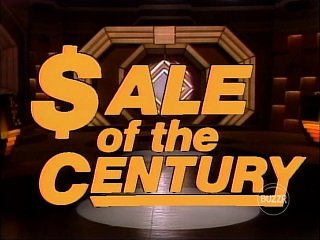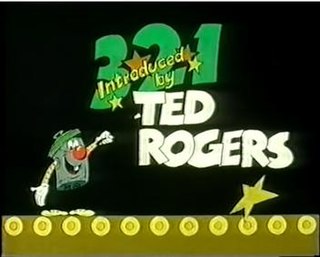
Press Your Luck is an American television game show created by Bill Carruthers and Jan McCormack. The show features contestants answering trivia questions to earn "spins" on a randomly-generated game board with 18 slides. Spaces on the board correspond to cash, extra spins, prizes, and the show's mascot, a cartoon creature known as the Whammy. Landing on the Whammy eliminates any cash and prizes accumulated while also displaying a short comedic animation. Its format is a revival of an earlier Carruthers production, Second Chance, which was hosted by Jim Peck and aired on ABC in 1977. The original version of Press Your Luck aired on CBS between 1983 and 1986. This version featured Peter Tomarken as host, Rod Roddy as announcer, and Carruthers as both director and voice of the Whammy.
Family Fortunes is a British television game show based on the American game show Family Feud. The programme ran on ITV from 6 January 1980 to 30 December 2002. A celebrity version, All Star Family Fortunes, followed from 2006 to 2015. In 2020, the original version of the show returned after 18 years with Gino D'Acampo as host.

The Krypton Factor is a British game show produced by Granada Television for broadcast on ITV. The show originally ran from 7 September 1977 to 20 November 1995 and was hosted by Gordon Burns and usually broadcast on the ITV network on Mondays at 7.00pm.

Blockbusters is a British television quiz show based upon an American quiz show of the same name. A solo player and a team of two answer trivia questions, clued up with an initial letter of the answer, to complete a path across or down a game board of hexagons.

Sale of the Century is an American television game show that originally debuted on September 29, 1969, on NBC daytime. It was one of three NBC game shows to premiere on that date, the other two being the short-lived game shows Letters to Laugh-In and Name Droppers. The series aired until July 13, 1973, and a weekly syndicated series began that fall and ran for one season.

Play Your Cards Right is a British television game show based on, and played similarly to, the American show Card Sharks.
The Joker's Wild is an American television game show that aired at different times between 1972 and 2019. In the show, contestants answer questions based on categories determined randomly by a mechanism resembling a slot machine. The show's title refers to the game's slot-machine mechanism also having jokers.

3–2–1 was a British game show that was made by Yorkshire Television for ITV. It ran for ten years, from 29 July 1978 to 24 December 1988, with Ted Rogers as the host.
Going for Gold is a British television game show that originally aired on BBC1 between 12 October 1987 and 9 July 1996. It was revived for Channel 5 from 13 October 2008 to 20 March 2009.
The Who, What, or Where Game is an American television game show that was broadcast weekdays on NBC from December 29, 1969, to January 4, 1974. The host was Art James, and the announcer was Mike Darow; Ron Greenberg packaged the show, which was recorded in NBC studios 6A and 8H in Rockefeller Plaza in New York City.
Celebrity Sweepstakes is an American television game show that aired on NBC's daytime schedule from April 1, 1974, to October 1, 1976. The show also had two separate weekly syndicated runs from September 9, 1974, to September 1975 and again from September 20, 1976, to September 1977.

Who Wants to Be a Millionaire? is a British television quiz show, created by David Briggs, Steven Knight & Mike Whitehill for ITV. The programme's format sees contestants taking on multiple-choice questions based upon general knowledge, winning a cash prize for each question they answer correctly, with the amount offered increasing as they take on more difficult questions. If an incorrect answer is given, the contestant will leave with whatever cash prize is guaranteed by the last safety net they have passed, unless they opt to walk away before answering the next question with the money the cash prize they had managed to reach. To assist in the quiz, contestants are given a series of "lifelines" to help answer questions.
Connections is a British game show, devised and produced by John Huntley, that aired on ITV from 26 April 1985 to 6 June 1990. The daytime version is hosted by Sue Robbie from 1985 to 1988 and Simon Potter from 1989 to 1990, while the primetime version is hosted by Richard Madeley.
The Price Is Right is a British game show based on the US version of the same name. It originally aired on ITV from 24 March 1984 to 8 April 1988 and was hosted by Leslie Crowther. The show later briefly moved to Sky One for one series as The New Price is Right from 4 September 1989 to 31 August 1990 with Bob Warman as the host.
Sale of the Century was a British game show based on a US game show of the same name. It was first shown on ITV from 9 October 1971 to 6 November 1983, hosted by Nicholas Parsons. Special Celebrity Sale of the Century editions aired occasionally, starting on 2 January 1981 with Steve Jones as host.

Wheel of Fortune is a British television game show based on the American show of the same name created by Merv Griffin. Contestants compete to solve word puzzles, similar to those used in Hangman, to win cash and prizes. The title refers to the show's giant carnival wheel that contestants spin throughout the course of the game to determine their cash and/or prizes.

Duel is an American game show hosted by Mike Greenberg that first aired from December 17 to December 23, 2007 on ABC. The show aired as a week-long six-episode tournament at 8:00 p.m. from Monday through Friday with the finale on Sunday.

The Chase is a British television quiz show broadcast on ITV and hosted by Bradley Walsh. Contestants play against a professional quizzer, known as the "chaser", who attempts to prevent them from winning a cash prize.
The Biggest Loser is a British reality television show that began airing on Sky Living from 2005 to 2006, before moving to ITV in 2009 and finished in 2012. Most recently hosted by Davina McCall, the show is a spin-off of the American reality television show of the same name.
Now You See It was a Scottish television game show that aired mostly in Scotland throughout its run. It was shown to a lesser degree across some of the ITV Network. It was based upon the U.S. version of the show and used the US show's "halftime cue" as its theme music.









